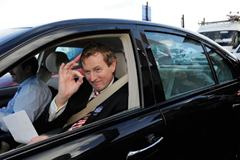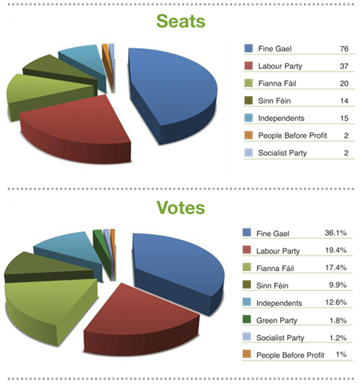Irish general election: A state transformed
 Meadhbh Monahan reviews the outcome of the Republic’s historic general election.
Meadhbh Monahan reviews the outcome of the Republic’s historic general election.
Fine Gael has become the biggest party in Ireland for the first time in its history, winning 76 seats (36.1 percent of first preference votes). Taoiseach-elect Enda Kenny said there had been “a democratic revolution at the ballot box.”
Fianna Fáil, which has been in government almost continuously since 1987, was punished by Irish voters who blame the party for the economic crisis. Its share of first percentage votes decreased from 41.5 per cent in 2007 to just 17.4 per cent and it lost 58 seats, returning only 20.
The rise of Sinn Féin and left-leaning independents was another interesting feature of this election. Sinn Féin’s popularity increased following Pearse Doherty’s election in the Donegal South West by-election in November. Doherty was returned for the Dáil along with 13 others, giving Sinn Féin a 9.9 per cent share of first preference vote. The United Left Alliance was formed in November as an umbrella group comprising of People Before Profit, Socialist Party and Workers Unemployed Action Group candidates. It returned five TDs, including former Socialist Party MEP Joe Higgins. The group are against water charges, property taxes and social welfare cuts. It demands that tax measures are focused on “the greedy and not the needy”.
The Green Party lost all six TDs it had gained in 2007 with leader John Gormley saying: “You have to accept the verdict. It’s a harsh verdict, but that’s democracy.”
Fifteen independents were returned to the Dáil with 12.6 per cent. They included Michael Healy-Rae for Kerry South, son of Jackie Healy-Rae, the former Fianna Fáil TD who became an independent in 1997.
At the time of going to press, negotiations on the new Programme for Government were underway between Fine Gael and the Labour Party, which had its best election ever, winning 37 seats (19.4 per cent).
Negotiations are set to be overshadowed by the European Central Bank, the IMF and the European Commission, which have made €85 billion available to rescue Ireland’s banks and sort out its €18 billion deficit. According to the EU and IMF, the broad terms of the four-year austerity plan, which will cut €10 billion in public spending and raise €5 billion in taxes, are non-negotiable. However, both Fine Gael and Labour manifestos claims they will re-negotiate the interest paid on the loan. German Chancellor Angela Merkel has said that the European Union cannot commit to lowering interest rates. “If the Irish Government now has a problem with interest rates, our job is to figure out what wecando–orwhetherwecando anything,” she said.
The 31st Dáil
Fine Gael won four seats out of five in Kenny’s Mayo constituency. It also won three seats out of five in Dublin South, Wicklow, Cavan-Monaghan and Carlow-Kilkenny. A total of 34 new Fine Gael candidates were elected. New faces include Jerry Buttimer for Cork South Central. A former seminarian who spent five years studying for the priesthood in Maynooth, Buttimer also taught adult education and wrote ‘Candidate: the diary of an Election Candidate’, following his experience of running for the 2007 general election. Twenty-eight year old Eoghan Murphy, a former speech writer at the Comprehensive Nuclear-Test Ban Treaty Organisation, was also elected to the Dáil.
Potential Cabinet members include deputy leader and health spokesman James Reilly (Dublin North), finance spokesman Michael Noonan (Limerick City), environment spokesman Phil Hogan (Carlow-Kilkenny), communications spokesman Simon Coveney (Cork South Central), enterprise spokesman Richard Bruton (Dublin North Central), education spokesman Fergus O’Dowd (Louth) and justice spokesman Alan Shatter (Dublin South).
 Despite campaign posters stating “Gilmore for Taoiseach”, Labour slipped slightly in the polls conducted in the week before the election. The party did, however, win its highest-ever number of seats, compared to 33 in 1992 when the ‘Rainbow coalition’ of Fine Gael, Labour and the Democratic Left were in power. There were 19 new Labour TDs including barrister Michael McNamara in Clare; a former human rights lawyer with the United Nations in Afghanistan.
Despite campaign posters stating “Gilmore for Taoiseach”, Labour slipped slightly in the polls conducted in the week before the election. The party did, however, win its highest-ever number of seats, compared to 33 in 1992 when the ‘Rainbow coalition’ of Fine Gael, Labour and the Democratic Left were in power. There were 19 new Labour TDs including barrister Michael McNamara in Clare; a former human rights lawyer with the United Nations in Afghanistan.
Labour’s negotiating team includes finance spokeswoman Joan Burton (Dublin West), European affairs spokesman Brendan Howlin (Wexford) and justice spokesman Pat Rabbitte (Dublin South West).
Fianna Fáil’s representation in Dublin fell from 19 to one, symbolising the fall of what was previously Ireland’s most popular party. Former Finance Minister Brian Lenihan was the only TD to keep his capital city seat. New party leader Micheál Martin was elected for Cork along with his running mate Michael McGrath. Other successes for the party werethere-electionofEámonÓCuív (grandson of Eamon de Valera) and the election of Barry Cowen, brother of Brian, for Laois Offaly. However, traditional strongholds such as Kerry and Tipperary are now without Fianna Fáil representation. A total of six constituencies have no Fianna Fáil TDs.
In addition, none of Fianna Fáil’s female candidates were returned. The demise of Tánaiste Mary Coughlan to left-wing Independent Thomas Pringle was an embarrassment. Another humiliation came to deputy leader Mary Hanafin, who hung on to the eleventh count in Dún Laoghaire but was beaten by People Before Profit candidate Richard Boyd Barrett.
Political dynasties have also come to an end. Seán Haughey lost his Dublin North Central seat. His father Charles was Taoiseach and his mother is a daughter of former Taoiseach Seán Lemass.
Initially derided for his move from West Belfast to Louth, Sinn Féin President Gerry Adams oversaw a successful result and will now, most likely, lead the left opposition in the Dáil. Jonathan O’Brien became the first Sinn Feín TD in Cork since 1922, finance spokesman Pearse Doherty took the Donegal South West seat and vice-president Mary Lou McDonald finally won a Dublin Central seat following two unsuccessful campaigns in 2002 and 2007. Adams said the party’s success represented the “reconquest of Ireland by the people of Ireland.”
A technical group, made up from a number of the newly-elected independent TDs, is now a possibility. There can only be one technical group and it qualifies for speaking rights in the Dáil. It requires at least seven members and it must comprise a majority of the independents in the Dáil.
Addressing his constituents following the announcement that he is to be Taoiseach, Kenny said: “The incoming government is not going to leave our people in the dark. Paddy likes to know what the story is.”





